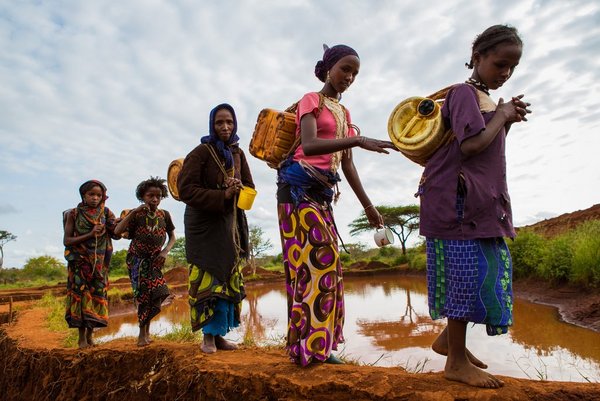 Read this article in French
Read this article in French- Share this article
- Subscribe to our newsletter
Daily water collection times could double
Under a high-emissions scenario, women will have to spend up to 30 per cent more time each day collecting water by 2050 on average worldwide. This can be reduced to 19 per cent if global warming is kept below 2 degree Celsius, according to a new study by scientists from the Potsdam Institute for Climate Impact Research (PIK) published in June 2024.
In regions of South America and Southeast Asia, the time spent collecting water could double due to higher temperatures. Worldwide, two billion people currently lack access to safe drinking water. The responsibility for collecting water typically falls on women and girls.
Across the globe, women in households without running water spend an average of 22.84 minutes every day collecting water – ranging from 4 minutes in parts of Indonesia to 110 minutes in regions of Ethiopia. The figures are based on data from 1990 to 2019.
“Regionally by 2050, daily water collection times could double under a high-emission scenario, for example, in regions across South America and Southeast Asia. For regions in eastern and central Africa that currently have the longest water collection times, there can be increases of between 20 and 40 per cent due to increases in temperature under a high emissions scenario,” says author Maximilian Kotz from PIK. Globally, women spend up to 200 million hours a day on this vital task (as of 2016), which can lead to major losses of time otherwise used for education, work or leisure and can sometimes be a physical and mental burden.
“Our results shed light on a gendered dimension of climate change impacts,” says Leonie Wenz, author and Head of the PIK research group Data-based analysis of climate decisions. “They show how strongly climate change will affect women’s well-being. Due to higher water collection times, they will lose time for education, work and leisure. By 2050, the cost of lost working time alone – calculated at the country-specific minimum wage – would be substantial, reaching tens to hundreds of millions of US dollars per country and year under a high-emissions scenario.”
(PIK/ile)
Read more on the PIK website





Add a comment
Be the First to Comment